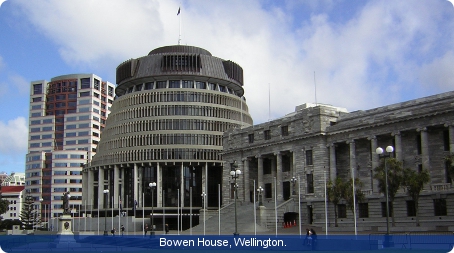Government
- Overview
- History

New Zealand is a constitutional monarchy and a parliamentary democracy. Queen Elizabeth II, represented in the country by a governor-general, remains head of state, but executive power is effectively held by the prime minister and cabinet.
The prime minister is appointed by the governor-general, and is generally the leader of the party or coalition holding the majority of seats in the House of Representatives. The cabinet is appointed by the governor-general on the recommendation of the prime minister.
The unicameral House of Representatives has 120 members, elected under a form of proportional representation (known as mixed member proportional, or MMP) for three years. The MMP system is designed to avoid domination by a majority group and gives a voice to minorities.
There is universal adult suffrage, and voters have both an electorate vote and a party vote. The former is used to select the local MP (since the 2001 census, 69 are elected on first-past-the-post constituencies, including seven representing Maori constituencies), while the latter is used to select a party and determine the total number of seats for each party in parliament. All parties polling more than 5% of the vote (or with at least one electorate seat) are entitled to further seats based on the proportion of party votes cast. Normally 51 members are party MPs but this number can be increased (increasing the total number of seats in parliament for the term) when a party wins more electorate seats than it is entitled to according to the party vote. This happened for the first time in September 2005.
The Supreme Court was established in 2004 as the final court of appeal, replacing the UK’s Privy Council. The High Court and District Court have jurisdiction in both civil and criminal matters, the High Court for the most serious cases. In the more serious criminal cases, whether in the High Court or District Court, defendants have the right to trial by jury. The Court of Appeal hears appeals from the High Court, and from trials by jury in the District Court, and the High Court hears appeals from the lower courts and tribunals.
The Family Court is a division of the District Court, and Justices of the Peace deal with minor criminal cases. The specialised tribunals include the Employment Tribunal, the Disputes Tribunal, the Waitangi Tribunal, the Environment Court and the Deportation Review Tribunal.

The Polynesian ancestors of the present Maori, skilled navigators of canoes fitted with sails and outriggers, arrived in New Zealand from Hawaii in about the tenth century. The Dutch explorer Abel Tasman sighted New Zealand in 1642 in his search for the southern continent, namely Antarctica. He named the South Island Nieuw Zeeland after the Dutch province.
James Cook, the eighteenth-century British explorer, circumnavigated both islands and chartered the shores. His encounters with Maori were usually peaceful, though occasional skirmishes resulted in the deaths of one Maori and ten Europeans. Cook’s good reports attracted sealers and traders, some from the new community in Sydney. Whalers came from America, Britain and France.
In 1840, the governor of New South Wales proclaimed British sovereignty over New Zealand and appointed a governor. Under the Treaty of Waitangi, 46 Maori chiefs ceded sovereignty to Queen Victoria, in exchange for retaining ownership of their natural resources. The treaty has been widely interpreted and is now applied in all aspects of New Zealand public life, notably in organisation and employment practice. Waitangi Day is celebrated each year on 6 February.
Immigration from Britain increased in the mid-nineteenth century, and by 1858 settlers outnumbered Maori.
In 1907 New Zealand became a dominion, which was effectively an acknowledgement of its independence. Independence was formally recognised by the Statute of Westminster in 1931. In 1947 the last restrictions on the right of its parliament to amend its constitution were removed.
The first general election under the MMP representation system was held in 1996. It gave 53 seats to a grouping consisting of the National Party and its allies the Association of Consumers and Taxpayers of New Zealand (ACT New Zealand) and United New Zealand.
The National Party, under the leadership of John Key, won the 2008 election with 59 seats and 45.5 per cent of votes, though like previous governments it would only be able to command a majority in the House with support from minority parties. Labour took 43 seats (33.8 per cent of votes).
In the 2011 elections the National Party, still under the leadership of John Key, increased its share of votes to 47.3 per cent, though with 59 seats it was still short of an absolute majority in parliament. With the support of ACT and United Future, John Key was sworn in as prime minister for a second time. In December 2011 the National Party formed a coalition government with ACT New Zealand, United Future and the Maori Party.



